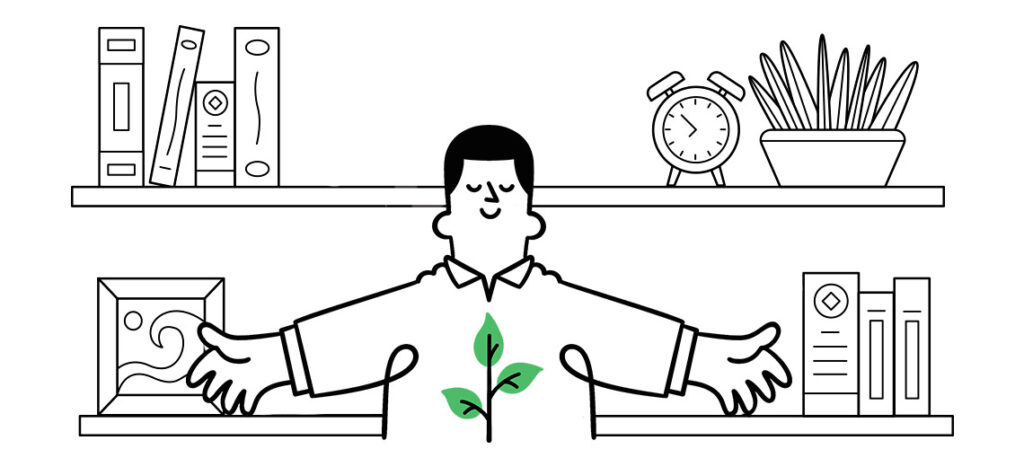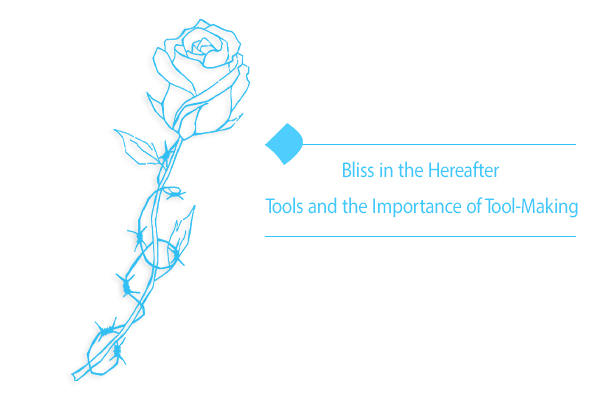How Does Knowing the Tools and the Importance of Tool-making Bring Us Closer to Our Goal?
Whenever we talk about tools and the importance of tool-making, we unconsciously think of a collection of objects which we use for a specific purpose, unaware of the fact that we have been engaged in making tools or using the tools we have made throughout our lives, whether in the fetal period or in the world. Although because we are attached to our bodies, we are not aware of the instrumental aspects of many things that we use.
Normally, our definition and understanding of tools is limited to a set of devices that we usually use to do physical work, things like scissors, pliers, knives, etc. For example, if we had to use our hands instead of scissors to cut a piece of paper, we would easily say that we did not use a tool. However, the hand that we used to cut the paper is a tool for us. It is a tool that if we did not have, we would be deprived of many blessings and resources that are available in this world. In this article, we will discuss tools and the importance of tool-making. We will also discuss the conditions in which we are deprived of tools, and finally, how and in what environment the tool-making process is done.
Being Deprived of Tools
We usually do not realize the importance of something until we lose it. Making tools and the importance of tool-making follows the same rule. Imagine we can no longer see the faces of our loved ones who we usually see and are acquainted with. Or we lose our sense of taste forever and we no longer have the ability to taste fruits or foods or enjoy different flavors.
Living without even one of these senses means being deprived of many pleasures and experiences that make us happy. It is a deprivation that the outside world is not to blame for. That is, all these pleasures are in the outside world and to use any of them, it is enough to have a healthy tool to enjoy it, like a healthy eye to see the moonrise, a healthy ear to hear the rain, a healthy skin to touch the trunk of a tree. The moon, the rain, and the tree are available to all of us and everywhere, but enjoying them requires tools.
If our tools are weak, destroyed, or if we do not have them from the beginning, the moon, rain, or tree are not to blame , and the world has not deprived us or others of any of its beauties. We are the ones who, under certain circumstances, have not brought the appropriate tools with us. Or as a result of an accident or inattention to having tools and the importance of tool-making, we have deprived ourselves of these pleasures.
Of course, lacking a tool does not mean that we do not like it. For example, imagine someone who is born with an inborn defect such as a neurological disorder and is unable to use his legs. It is true that the “walking tool” in his body does not function properly, but the “desire to walk” always exists in him. This point also applies to the rest of our perceptual tools. For example, the eye is a tool for our vision, and its absence does not eliminate visible things, nor does it eliminate the desire to see in a blind person. In fact, it is this desire that makes us do whatever we can to cure our physical ailments.
Where and How Are Tools Made?
But at which stage of our lives are these tools made? Interestingly, all the organs that we use as worldly tools come into existence at a stage that none of us consider as a part of our lives!
It is during our fetal period that our bodies and our vital organs are developed. Although these organs react to the external stimuli in the womb environment to some extent, none of them are useful in the mother’s womb.
The fetus is constantly completing himself in the mother’s womb. He makes a heart, brain, digestive system, respiratory system, blood circulation, tongue, eyes, ears, and other tools. He prepares himself to enter an infinitely greater stage full of events and pleasures that are unimaginable and indescribable for him.
The eyes, ears, respiratory system, power of thinking, or any of the other tools that are being built in the body of the fetus are not useful in the small and limited environment of the mother’s womb. However, the parents, who are aware of the necessities of life in the world, are quite careful not to let the slightest problem come up in the process of the fetus’s development. If a problem occurs, they try to treat it at the same fetal stage; otherwise, they will be faced with the birth of a weak, sick, or defective baby that may suffer for the rest of his life. Of course, just as making tools and the importance of tool-making is crucial for life in this world, it also plays a decisive role in our lives in the hereafter. We will discuss the importance of this role later.
In the previous lessons, we learned that according to the Law of Proportion, just as there is a relationship between the mother’s womb and the world, there is also a relationship between the world and the hereafter. So if the world is almost nothing compared to the hereafter, why is it important in our lives? Basically, the answer to this question is related to the same proportion that we stated. Has anyone ever questioned the necessity of staying in the mother’s womb before entering the world or considered the time spent in the mother’s womb useless and pointless? In fact, the importance of the mother’s womb for our lives in the world is due to its constructive capability. Life in the next stage is not possible without the development of the body in the womb.
Making Tools for the Hereafter

Just as the tools required for life in the world are necessarily made in the previous stage, i.e., the mother’s womb, the tools needed for life in the hereafter must be made in the previous stage, i.e., the world. This world does not have the potentials of the mother’s womb, nor does the hereafter have the potentials of the womb of the world to make the necessary tools. Making tools and the importance of tool-making for the hereafter is no less than the world, but because of the eternal structure of the hereafter and the eternal life we will have in it, it is more important. The slightest delay and interruption in the functioning of the womb is equal to enduring a lifetime of suffering. This suffering is not due to the conditions of the world or the hereafter but to the lack of compatibility with the conditions of these environments.
As we mentioned before, the womb is the place where the organs and tools necessary for life in the next stage are made. In the mother’s womb, the “body” is prepared for the worldly life, and in the womb of the world, we must prepare our “heart” or “soul” for the hereafter. Making tools and the importance of tool-making in both wombs hold a special place, but the difference is that in the mother’s womb, the growth of the fetus is involuntary, but in the world, the effort to acquire a sound heart, cultivate the human dimension, and make tools for the hereafter depends on our own free will.
The fetus in the mother’s womb does not have free will, and tools are made for him according to the conditions in the womb. But in this world, we have free will which we must use for the right tool-making. This is because, as we stated, becoming and tool-making are the inherent qualities of the womb. Even if we do not know and make no effort for this to happen, we are in the process of tool-making for the hereafter, whether this tool-making is right and in the direction of acquiring a sound heart or it is being done on the wrong path.
In this article, we discussed making tools and the importance of tool-making for this world and the hereafter. Just as tool-making for life in the world takes place in the stage before it, i.e., in the mother’s womb, the preparation and acquisition of the necessary tools for the hereafter also take place in the womb of the world. We are constantly in the process of tool-making in each of these wombs, and our deprivation of the resources of this world or the hereafter is not related to the structure of these environments, in fact, it is due to our lack of proper tools.
Do you also pay attention to making tools and the importance of tool-making in the world? Share your thoughts on this with us.

